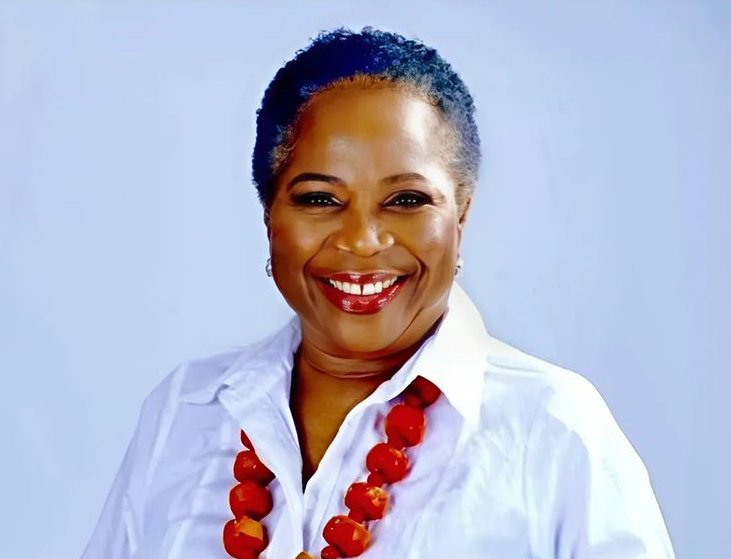Onyeka Onwenu, widely celebrated as “The Elegant Stallion,” was a Nigerian singer, songwriter, actress, journalist, and activist whose career spanned four decades. She passed away on 30 July 2024 in Lagos at the age of 72, leaving behind an enduring legacy in music, film, media, and public service.
Early Life and Education
Born in Obosi, Anambra State, Onyeka was the youngest child of politician Dickson Onwenu and singer Hope Onwenu. She grew up partly in Port Harcourt before moving abroad for higher education.
Onyeka studied International Relations and Communications at Wellesley College, Massachusetts, and later obtained a Master’s in Media Studies from The New School, New York.
Media and Music Career
Onyeka began her professional career at the Nigerian Television Authority (NTA), where she gained prominence as a journalist and documentarian. Her most notable early work was the acclaimed documentary Nigeria: A Squandering of Riches (1984), co-produced with the BBC, which investigated corruption and mismanagement in post-independence Nigeria.
Her entry into music came in 1981 with her debut album For the Love of You. By the mid-1980s, she had become a household name with a series of albums, including Golden Songs Vol. 1 (1984), Vol. 2 (1986), and Vol. 3 (1991).
Among her most beloved songs are:
“One Love” (1986): A pan-African anthem for peace and unity.
“Wait for Me” (1989): A duet with King Sunny Ade promoting family planning.
“You and I,” “Ekwe,” “Bia Nulu,” “Iyogogo,” and “Dancing in the Sun.”
By the 1990s, she transitioned partly into gospel music, further expanding her artistic influence.
Film and Acting
Onyeka also built a successful career in Nollywood, appearing in over two dozen films. Notable roles include:
Conspiracy (1998), which also featured her hit song “You and I.”
Half of a Yellow Sun (2013), adapted from Chimamanda Ngozi Adichie’s novel.
Lionheart (2018), directed by Genevieve Nnaji and later acquired by Netflix.
Her acting work reinforced her reputation as one of Nigeria’s most versatile cultural figures.
Advocacy and Public Service
Onwenu consistently used her platform for advocacy. Her music often addressed women’s rights, social justice, and national unity. In 2000, she famously staged a three-day hunger strike at NTA to protest unpaid royalties, highlighting her commitment to artists’ welfare.
She served in public roles including:
Chairperson, Imo State Council for Arts and Culture (2013).
Executive Director/CEO, National Centre for Women Development (NCWD) (2016).
In recognition of her contributions, Onyeka was awarded the Member of the Order of the Federal Republic (MFR) in 2011.
Passing and Legacy
Onyeka Onwenu died on 30 July 2024 shortly after performing her signature song One Love at the 80th birthday celebration of Stella Okoli, CEO of Emzor Pharmaceuticals. She was rushed to Reddington Hospital, Lagos, where she was pronounced dead.
Her funeral was held privately at Ikoyi Cemetery, Lagos, on 30 August 2024, in accordance with her wishes.
Tributes flowed nationwide, including from President Bola Tinubu, entertainers such as King Sunny Ade and Charly Boy, and political leaders like Peter Obi.
Legacy
Onyeka Onwenu’s career embodied the intersection of art, activism, and public service. From investigative journalism to timeless music, from Nollywood screens to policy leadership, she elevated Nigerian culture while championing justice and equality. Her voice, both literal and symbolic, remains a defining thread in the story of modern Nigerian arts and advocacy.
Sources
The Guardian (UK): “Nigerian singer, actor and activist Onyeka Onwenu dies aged 72.”
FOLLOW US ON:
FACEBOOK
TWITTER
PINTEREST
TIKTOK
YOUTUBE
LINKEDIN
TUMBLR
INSTAGRAM































